In this photo taken on Friday, May 15, 2020, Dr. Osman Osmanov has a rest after his shift at an intensive care unit of the Filatov City Clinical Hospital in Moscow, Russia. Moscow accounts for about half of all of Russia's coronavirus cases, a deluge that strains the city's hospitals and has forced Osmanov to to work every day for the past two months, sometimes for 24 hours in a row. (AP Photo/Pavel Golovkin)
The Associated Press
MOSCOW (AP) - As he strides down the sidewalk outside Moscow's Filatov Hospital in blue jeans and garish crimson shoes, Dr. Osman Osmanov shows no signs of the rigors he's just been through.
But behind the veneer of calm is a yearning for relief from countless days of laboring to save the lives of the stream of coronavirus victims who come into the hospital on gurneys, frightened and struggling to breathe.
'œFrankly speaking, I just want to be in silence for a couple of days. I would like to go somewhere in the mountains where there is no cell phone signal, so I can sit quietly and have some air," the 40-year-old intensive care physician told The Associated Press at the end of yet another long shift at the epicenter of Russia's coronavirus outbreak.
He smiles hesitantly when he expresses the wish, as if confessing a secret.
Moscow accounts for about half of all of Russia's 335,000 coronavirus cases and 3,288 deaths, a deluge that strains the city's hospitals and has forced Osmanov to to work every day for the past two months, sometimes for 24 hours at a time.
The demands are intense; the rewards are gratifying.
'œWhen a patient starts suffocating, you should calm him down. People are just scared," he said. 'œIf you come and give him some oxygen, put him in a prone position, the situation changes right in front of your eyes."
'œSometimes all you need is to calm down a patient, and then he feels much better,'ť Osmanov said.
In the early days of the outbreak, he said, he watched the crisis unfold with some scientific detachment.
'œAt first, it was interesting, of course. Everyone took it as something new," he said. 'œI had an impression at first, that we were fighting an invisible enemy.'ť
Now, after weeks of seemingly endless work, he is struggling to remain stoic.
'œI am not at the end of my rope," he said, 'œbut I feel tired.'ť
There is no end in sight for Osmanov's punishing workload. Although new case counts have begun falling, to 9,434 on Saturday, down from more than 10,000 a day last week, Russia on Friday recorded its highest one-day death toll of 150.
'œThe current situation doesn't allow" for rest, he said. 'œSo we're just hoping that soon it will all end, we will win and it will all be fine.'ť
In this photo taken on Saturday, May 16, 2020, Dr. Osman Osmanov walks through a disinfectant sluice after his shift at an intensive care unit of the Filatov City Clinical Hospital in Moscow, Russia. Moscow accounts for about half of all of Russia's coronavirus cases, a deluge that strains the city's hospitals and has forced Osmanov to to work every day for the past two months, sometimes for 24 hours in a row. (AP Photo/Pavel Golovkin)
The Associated Press
In this photo taken on Saturday, May 16, 2020, Dr. Osman Osmanov waits as a medical worker paints his protective gear during a rest on his shift at the Filatov City Clinical Hospital in Moscow, Russia. Moscow accounts for about half of all of Russia's coronavirus cases, a deluge that strains the city's hospitals and has forced Osmanov to to work every day for the past two months, sometimes for 24 hours in a row. (AP Photo/Pavel Golovkin)
The Associated Press
In this photo taken on Friday, May 15, 2020, Dr. Osman Osmanov starts his shift at an intensive care unit of the Filatov City Clinical Hospital in Moscow, Russia. Moscow accounts for about half of all of Russia's coronavirus cases, a deluge that strains the city's hospitals and has forced Osmanov to to work every day for the past two months, sometimes for 24 hours in a row. (AP Photo/Pavel Golovkin)
The Associated Press
In this photo taken on Friday, May 15, 2020, Dr. Osman Osmanov, center, and Dr. Vitaly Mushkin, right, prepare a coronavirus patient on artificial lung respiration for computer tomography screening at an intensive care unit of the Filatov City Clinical Hospital in Moscow, Russia. Moscow accounts for about half of all of Russia's coronavirus cases, a deluge that strains the city's hospitals and has forced Osmanov to to work every day for the past two months, sometimes for 24 hours in a row. (AP Photo/Pavel Golovkin)
The Associated Press
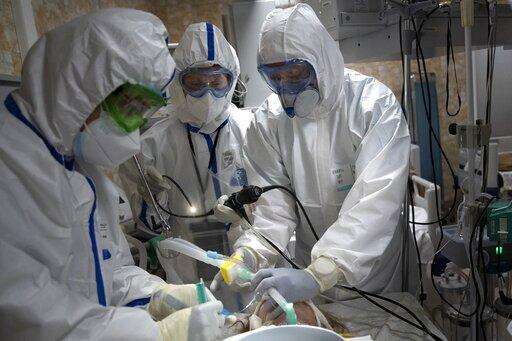
In this photo taken on Friday, May 15, 2020, Dr. Osman Osmanov, right, and Dr. Konstantin Glebov, center left, and Dr. Vitaly Mushkin perform tracheal intubation of a coronavirus patient on artificial lung respiration at an intensive care unit of the Filatov City Clinical Hospital in Moscow, Russia. Moscow accounts for about half of all of Russia's coronavirus cases, a deluge that strains the city's hospitals and has forced Osmanov to to work every day for the past two months, sometimes for 24 hours in a row. (AP Photo/Pavel Golovkin)
The Associated Press
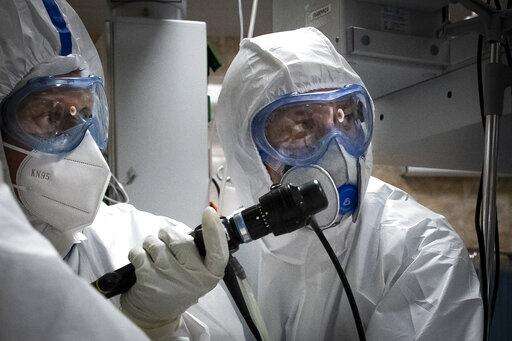
In this photo taken on Friday, May 15, 2020, Dr. Osman Osmanov, center, and Dr. Konstantin Glebov, center left, perform tracheal intubation of a coronavirus patient on artificial lung respiration at an intensive care unit of the Filatov City Clinical Hospital in Moscow, Russia. Moscow accounts for about half of all of Russia's coronavirus cases, a deluge that strains the city's hospitals and has forced Osmanov to to work every day for the past two months, sometimes for 24 hours in a row. (AP Photo/Pavel Golovkin)
The Associated Press
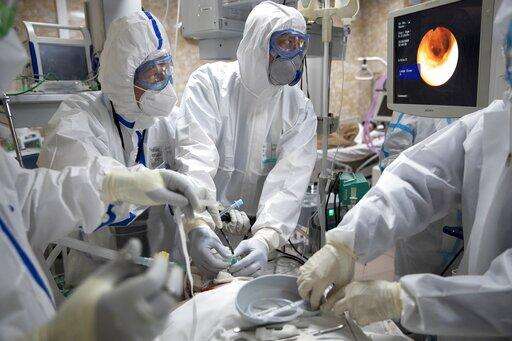
In this photo taken on Friday, May 15, 2020, Dr. Osman Osmanov, center, and Dr. Konstantin Glebov, center left, perform tracheal intubation on a coronavirus patient on artificial lung respiration at an intensive care unit of the Filatov City Clinical Hospital in Moscow, Russia. Moscow accounts for about half of all of Russia's coronavirus cases, a deluge that strains the city's hospitals and has forced Osmanov to to work every day for the past two months, sometimes for 24 hours in a row. (AP Photo/Pavel Golovkin)
The Associated Press
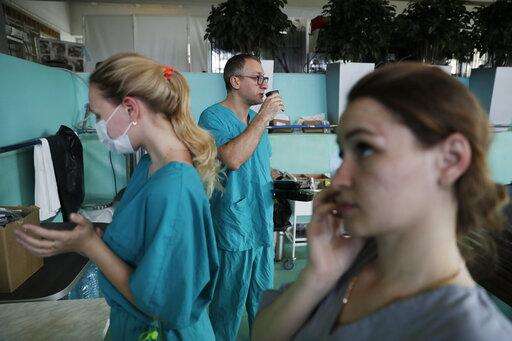
In this photo taken on Friday, May 15, 2020, Dr. Osman Osmanov, center, drinks a coffee as he has breakfast before his shift at an intensive care unit of the Filatov City Clinical Hospital in Moscow, Russia. Moscow accounts for about half of all of Russia's coronavirus cases, a deluge that strains the city's hospitals and has forced Osmanov to to work every day for the past two months, sometimes for 24 hours in a row. (AP Photo/Pavel Golovkin)
The Associated Press
In this photo taken on Friday, May 15, 2020, Dr. Osman Osmanov, center, has breakfast before his shift at an intensive care unit of the Filatov City Clinical Hospital in Moscow, Russia. Moscow accounts for about half of all of Russia's coronavirus cases, a deluge that strains the city's hospitals and has forced Osmanov to to work every day for the past two months, sometimes for 24 hours in a row. (AP Photo/Pavel Golovkin)
The Associated Press
In this photo taken on Friday, May 15, 2020, Dr. Osman Osmanov, center, puts on protective gear before his shift at an intensive care unit of the Filatov City Clinical Hospital in Moscow, Russia. Moscow accounts for about half of all of Russia's coronavirus cases, a deluge that strains the city's hospitals and has forced Osmanov to to work every day for the past two months, sometimes for 24 hours in a row. (AP Photo/Pavel Golovkin)
The Associated Press
In this photo taken on Friday, May 15, 2020, Dr. Osman Osmanov puts on protective gear before his shift at an intensive care unit of the Filatov City Clinical Hospital in Moscow, Russia. Moscow accounts for about half of all of Russia's coronavirus cases, a deluge that strains the city's hospitals and has forced Osmanov to to work every day for the past two months, sometimes for 24 hours in a row. (AP Photo/Pavel Golovkin)
The Associated Press
In this photo taken on Friday, May 15, 2020, Dr. Osman Osmanov, left, and his colleagues treat a coronavirus patient on artificial lung respiration at an intensive care unit of the Filatov City Clinical Hospital in Moscow, Russia. Moscow accounts for about half of all of Russia's coronavirus cases, a deluge that strains the city's hospitals and has forced Osmanov to to work every day for the past two months, sometimes for 24 hours in a row. (AP Photo/Pavel Golovkin)
The Associated Press
In this photo taken on Friday, May 15, 2020, Dr. Osman Osmanov, center, and his colleagues treat a coronavirus patient on artificial lung respiration at an intensive care unit of the Filatov City Clinical Hospital in Moscow, Russia. Moscow accounts for about half of all of Russia's coronavirus cases, a deluge that strains the city's hospitals and has forced Osmanov to to work every day for the past two months, sometimes for 24 hours in a row. (AP Photo/Pavel Golovkin)
The Associated Press
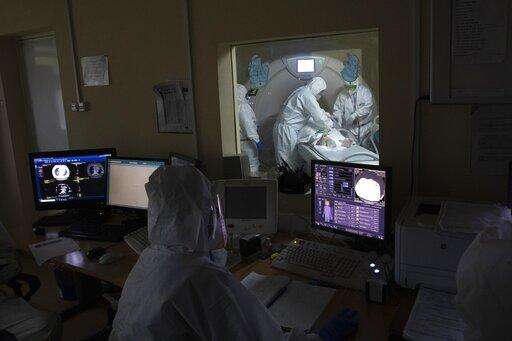
In this photo taken on Friday, May 15, 2020, Dr. Osman Osmanov, center, and Dr. Vitaly Mushkin, right, prepare a coronavirus patient on artificial lung respiration for computer tomography screening at an intensive care unit of the Filatov City Clinical Hospital in Moscow, Russia. Moscow accounts for about half of all of Russia's coronavirus cases, a deluge that strains the city's hospitals and has forced Osmanov to to work every day for the past two months, sometimes for 24 hours in a row. (AP Photo/Pavel Golovkin)
The Associated Press
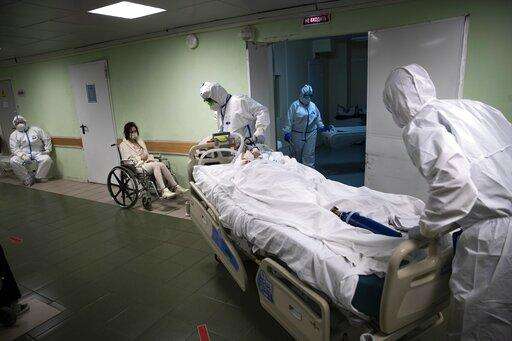
In this photo taken on Friday, May 15, 2020, Dr. Osman Osmanov, right back to camera, and Dr. Vitaly Mushkin, center, move a coronavirus patient on artificial lung respiration for computer tomography screening at an intensive care unit of the Filatov City Clinical Hospital in Moscow, Russia. Moscow accounts for about half of all of Russia's coronavirus cases, a deluge that strains the city's hospitals and has forced Osmanov to to work every day for the past two months, sometimes for 24 hours in a row. (AP Photo/Pavel Golovkin)
The Associated Press
In this photo taken on Friday, May 15, 2020, Dr. Osman Osmanov takes off a mask after his shift at an intensive care unit of the Filatov City Clinical Hospital in Moscow, Russia. Moscow accounts for about half of all of Russia's coronavirus cases, a deluge that strains the city's hospitals and has forced Osmanov to to work every day for the past two months, sometimes for 24 hours in a row. (AP Photo/Pavel Golovkin)
The Associated Press
In this photo taken on Saturday, May 16, 2020, Dr. Osman Osmanov leaves the Filatov City Clinical Hospital after his shift at an intensive care unit in Moscow, Russia. Moscow accounts for about half of all of Russia's coronavirus cases, a deluge that strains the city's hospitals and has forced Osmanov to to work every day for the past two months, sometimes for 24 hours in a row. (AP Photo/Pavel Golovkin)
The Associated Press
In this photo taken on Saturday, May 16, 2020, Dr. Osman Osmanov is greeted by his wife Saida after a shift at an intensive care unit of Filatov City Clinical Hospital in Moscow, Russia. Moscow accounts for about half of all of Russia's coronavirus cases, a deluge that strains the city's hospitals and has forced Osmanov to to work every day for the past two months, sometimes for 24 hours in a row. (AP Photo/Pavel Golovkin)
The Associated Press
In this photo taken on Saturday, May 16, 2020, Dr. Osman Osmanov drinks coffee with his wife Saida at home after his shift at an intensive care unit of Filatov City Clinical Hospital in Moscow, Russia. Moscow accounts for about half of all of Russia's coronavirus cases, a deluge that strains the city's hospitals and has forced Osmanov to to work every day for the past two months, sometimes for 24 hours in a row. (AP Photo/Pavel Golovkin)
The Associated Press